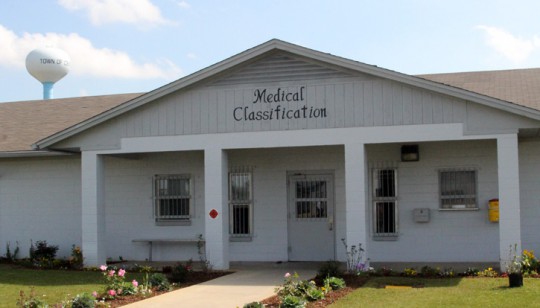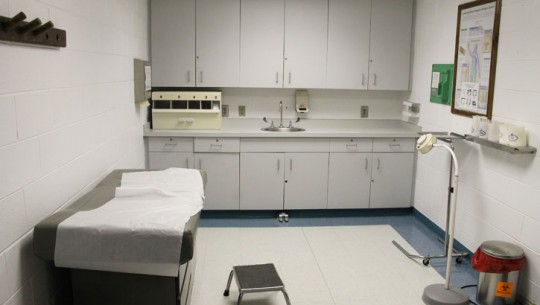Inmate Health Costs Drive Up Florida Prison Budget
February 11, 2019
Gov. Ron DeSantis wants to fund the Florida Department of Corrections next year at $2.7 billion, a spending plan that has some criminal-justice reform advocates pointing to struggles facing Florida’s prison system as a result of increased health-care costs.
Following litigation, the state needs to meet court mandates requiring it to provide better treatment for inmates with Hepatitis C, mental illnesses and disabilities. Those issues, mixed with an aging prison population that is driving up health costs, has led DeSantis to propose a $120 million increase to cover inmates’ health care.
“The story this budget tells is that we are simply funding the mandated costs of court orders and trying to keep the lights on in the prison system,” said Sen. Jeff Brandes, a St. Petersburg Republican who chairs the Senate panel that oversees prison funding.
 The blueprint of DeSantis’ spending plan for the Department of Corrections, roughly 3 percent of the entire budget, includes $14 million for increased costs of pharmaceuticals, $37 million to better treat inmates with Hepatitis C and $86 million to enhance contracted inmate health services. While those issues total $137 million, the overall increase would be about $120 million because the budget proposal also would cut some spending included in the current year’s budget.
The blueprint of DeSantis’ spending plan for the Department of Corrections, roughly 3 percent of the entire budget, includes $14 million for increased costs of pharmaceuticals, $37 million to better treat inmates with Hepatitis C and $86 million to enhance contracted inmate health services. While those issues total $137 million, the overall increase would be about $120 million because the budget proposal also would cut some spending included in the current year’s budget.
While the state deals with increased pharmaceutical costs, DeSantis has directed Corrections Secretary Mark Inch to explore various strategies to drive those expenses down, including further negotiations with pharmaceutical companies and bulk purchases, according to language in the proposed budget.
A lot of those costs stem from litigation brought by attorneys for the Florida Justice Institute. A federal judge found that the Department of Corrections had failed to treat prisoners with Hepatitis C despite the fact that medications had been available. The court also found the lack of treatment was due to financial issues.
With the 2019 legislative session starting March 5, Brandes has been sounding the alarm about the prison system being in “crisis” as a result of a prison guard shortage, increased contraband in prisons and a rise in officer-on-inmate violence.
“Right now, the corrections system is largely a health care provider that houses inmates,” Brandes said. “There’s a lack of education and transition programs because of the enormity of money we are spending on health care.”
DeSantis proposed an overall $91.3 billion budget for the 2019-2020 fiscal year, which starts July 1. Lawmakers will use the governor’s proposal as they negotiate a final spending plan this spring.
Other parts of the criminal justice system that are funded by the state include the Department of Juvenile Justice, which DeSantis wants to fund at $602 million next year, about $437,000 less than the current year.
DeSantis has appointed Simone Marstiller to head the juvenile justice department. In the past, Marstiller has been a vocal proponent of putting more focus on rehabilitation instead of incarceration, as well as giving discretion to judges to depart from mandatory minimums in sentencing.
Christian Minor, executive director for the Florida Juvenile Justice Association, was pleased to see the level of funding DeSantis proposed for prevention, intervention and residential services in the upcoming budget.
by Ana Ceballos, The News Service of Florida
Pictured: Inmate medical facilities inside the Century Correctional Institution. NorthEscambia.com file photos.
Comments
6 Responses to “Inmate Health Costs Drive Up Florida Prison Budget”




Let’s keep them in the best health possible, better than there victims. This is way beyond insane. They sure weren’t worried about keeping their victims healthy This is to make insurance co’s rich..
Nothing- I’m with you… You mean to tell me the officers that put there life in danger on a daily basis gets NOTHING at all.. This is a disgrace!!!!!!!!!!!!!!!!!
Prison funding is such a complicated issue. The easy road is to say F’it, they’re criminals, let them rot. Is that the kind of society we want to be? “The degree of civilization in a society is revealed by entering its prisons.” Fyodor Dostoyevsky
Think about yourself in there, especially if your were wrongfully convicted. Wouldn’t you want to be treated with a modicum of dignity.There are so many complicated issues with prisons. Slo Mo talks about mental health and is right, it is a huge issue. So is privatization. Another area of concern is who should be in prison?
Personally, I think crimes against persons should top the list. If you are a murderer, rapist, child molester, spouse beater, you commit some act of physical violence against someone or armed robber, you are priority number one. If you are a burglar or thief, you are priority 2. If you are a fraudster or check kiter you are priority three.
The average cost per inmate has been reported numerous times to be north of $25k/year and increasing. $30k/inmate/year is approaching fast. As the article states, the avaerage age is also increasing, which means we have people in prison who are most likely physically incapable of perpetrating another crime. What Florida does not have is a parole system that could review inmates on some recurring basis and perhaps start releasing and returning some of them to society ahead of their rediculously long sentences.
Finally, the Florida legislature needs to quit with the never ending “tough on crime” ideas they continually come up with to show/improve their “credibility” with the voters who are busy thinking with their emotions instead of a logical approach where one might ask for data, studies, and what is the return on a new law other than just more prisoners and higher budgets. Minimum sentencing guidelines are a prime example.
If they would take the private companies out of the prison system that would help. Those companies are only in it for the money and not the care. The medical staff are short staffed (like most of healthcare). They do not pay anybody well at all, especially for the environment the staff is in. Mental health is will be always a sticking point since most patients only get treatment when incarcerated. We, in general, need better mental health care in this nation and stop treating it like it is a crime in itself.
No raises for the officers?